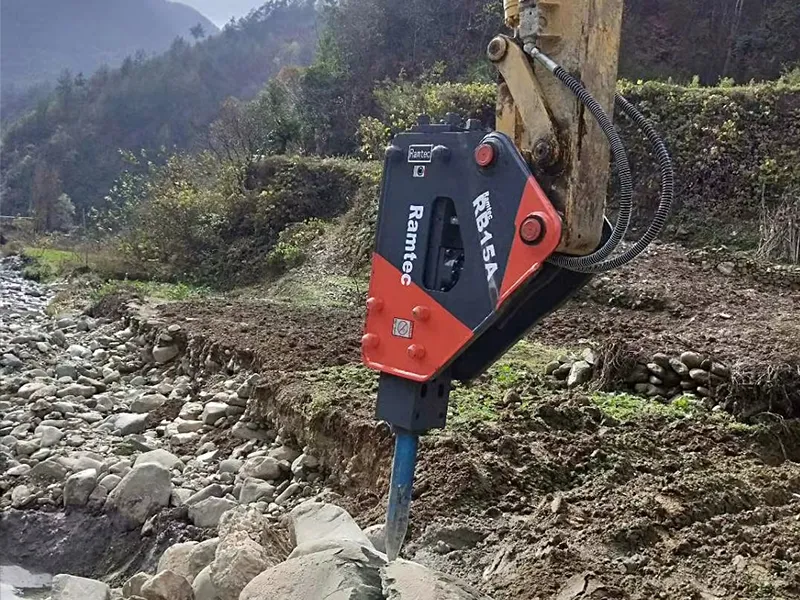Maximize Efficiency: Understanding the Benefits of Hydraulic Breakers for Wheel Loaders
Maximize Efficiency: Understanding the Benefits of Hydraulic Breakers for Wheel Loaders
Table of Contents
- 1. Introduction to Hydraulic Breakers
- 2. What Are Hydraulic Breakers?
- 3. Advantages of Hydraulic Breakers for Wheel Loaders
- 4. Applications of Hydraulic Breakers in Construction
- 5. Operational Best Practices for Using Hydraulic Breakers
- 6. Maintenance Tips for Hydraulic Breakers
- 7. Choosing the Right Hydraulic Breaker for Your Wheel Loader
- 8. Conclusion
- 9. Frequently Asked Questions
1. Introduction to Hydraulic Breakers
In the realm of construction equipment, **hydraulic breakers** are pivotal tools that significantly enhance the functionality of wheel loaders. Designed to deliver powerful blows, these attachments break through tough materials like concrete and asphalt with ease. As the demand for efficiency in engineering and construction grows, understanding the benefits of hydraulic breakers becomes essential for operators and managers alike.
2. What Are Hydraulic Breakers?
Hydraulic breakers are attachments designed to convert hydraulic energy into mechanical energy, delivering a high-impact force suitable for breaking tough surfaces. These devices consist of a housing, a piston, a chisel or breaker tool, and hydraulic connections. When attached to a wheel loader, hydraulic breakers enable the machinery to perform tasks previously thought impossible or inefficient.
3. Advantages of Hydraulic Breakers for Wheel Loaders
3.1 Enhanced Productivity
Utilizing hydraulic breakers drastically enhances productivity on job sites. These machines can effectively break up concrete, rocks, and other materials in a fraction of the time it would take conventional methods. By reducing the time spent on demolition and site preparation tasks, operators can redirect their efforts toward other productivity-enhancing activities.
3.2 Cost-Effectiveness
Investing in hydraulic breakers translates into long-term savings. By increasing efficiency, these tools reduce labor costs and decrease the time required to complete projects. Furthermore, fewer man-hours mean less fuel consumption and reduced wear and tear on equipment, leading to lower operational costs.
3.3 Improved Safety
Safety is paramount in construction environments. Hydraulic breakers contribute to a safer work environment by minimizing manual labor and reducing the risk of injury associated with traditional demolition methods. Operators can perform tasks from the safety of the wheel loader, keeping them away from potential hazards.
4. Applications of Hydraulic Breakers in Construction
Hydraulic breakers are incredibly versatile and can be employed in various applications within the construction sector.
4.1 Demolition Work
One of the primary applications of hydraulic breakers is demolition work. Whether it’s breaking down buildings, tearing apart pavement, or clearing land, these tools provide the impact needed to efficiently dismantle structures.
4.2 Site Preparation
Before new construction begins, site preparation is essential. Hydraulic breakers can quickly clear and level surfaces, remove old foundations, and break through rocky terrain, ensuring the site is ready for development.
5. Operational Best Practices for Using Hydraulic Breakers
To maximize the efficiency of hydraulic breakers, operators should adhere to specific best practices:
- **Proper Training**: Ensure all operators are trained in the use of hydraulic breakers and understand safety protocols.
- **Regular Inspections**: Conduct routine inspections of both the hydraulic breaker and the wheel loader to identify any issues before they escalate.
- **Attachment Compatibility**: Always check that the hydraulic breaker is compatible with the wheel loader to ensure optimal performance.
- **Maintain Steady Pressure**: Operators should maintain steady hydraulic pressure for consistent impact force.
6. Maintenance Tips for Hydraulic Breakers
Keeping hydraulic breakers in top condition is crucial for performance and longevity. Here are essential maintenance tips:
- **Daily Cleaning**: Clean the attachment after each use to prevent debris buildup that can damage components.
- **Lubrication**: Regularly lubricate moving parts to minimize friction and wear.
- **Monitor Wear Parts**: Regularly check the chisel or breaker tool for wear and replace it as necessary to maintain efficiency.
7. Choosing the Right Hydraulic Breaker for Your Wheel Loader
Selecting the appropriate hydraulic breaker hinges on several factors:
- **Size of Wheel Loader**: Match the breaker size to the capabilities of your wheel loader to ensure optimal performance.
- **Type of Work**: Consider the primary tasks you’ll be performing. Different breakers cater to varying degrees of impact and are designed for specific applications.
- **Hydraulic Flow Rate**: Ensure the hydraulic flow rate of your wheel loader aligns with the requirements of the hydraulic breaker.
8. Conclusion
Hydraulic breakers are indispensable tools in the construction industry, significantly improving the efficiency and safety of wheel loaders. By understanding their advantages, applications, and proper maintenance, operators can maximize productivity and reduce costs on job sites. Investing in these powerful attachments is not just a choice but a strategic decision aimed at enhancing operational effectiveness.
9. Frequently Asked Questions
1. What is the primary function of hydraulic breakers?
Hydraulic breakers are designed to break tough materials like concrete and rock using high-impact force, making them ideal for demolition and site preparation tasks.
2. How can hydraulic breakers improve safety on job sites?
By allowing operators to perform demolition work from within the safety of their equipment, hydraulic breakers reduce the risk of injury associated with manual labor.
3. What maintenance practices should I follow for hydraulic breakers?
Regular cleaning, lubrication, and monitoring of wear parts are essential for maintaining hydraulic breakers and ensuring their longevity.
4. Can hydraulic breakers be used with any wheel loader?
No, it’s important to select a hydraulic breaker that is compatible with your specific wheel loader model to ensure optimal performance.
5. How do hydraulic breakers contribute to cost savings?
By increasing efficiency and reducing project completion time, hydraulic breakers lower labor costs and fuel consumption, leading to significant operational savings.
By understanding and implementing the benefits of hydraulic breakers, we can transform our approach to construction and demolition tasks, thus achieving unparalleled efficiency and productivity in our operations.
Related News
